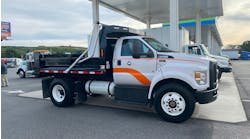Unelected ‘extremists’ threaten U.S. economy, warns ATA leader
AUSTIN, Texas—Allowing unelected California regulators to dictate unrealistic national emission policy will run the nation “right off the cliff,” American Trucking Associations’ Chris Spear warned industry executives in a fiery speech during the trade organization’s Management Conference & Exhibition.
The ATA president and CEO said the trucking industry's work in reducing emissions needs to be realistic and attainable. “At ATA, we start with yes,” Spear said during his annual address. “If the goal is to reduce emissions, eliminate the century-old federal excise tax, which adds 12.5% to the price of every new tractor purchased today. That’s roughly $25,000 per power unit. Those same new trucks produce 98.5% less emissions than half of all the trucks currently operating in California.”
See also: How to prep for California's Clean Truck Check programHe noted that the industry has made real progress in reducing emissions. Heavy-duty diesel trucks built today are 60 times cleaner than Class 8 trucks built a generation ago. “In fact, 53% of trucks operating today in California are equipped with 2010 model engines or older,” he said. “Replacing them with today’s equipment would reduce emissions in the state by 83%. We can cut emissions—starting right now. This would save lives by putting the safest equipment on our roadways. And it would support jobs—union jobs, which I understand is a major priority for the most pro-union president in American history. Truth is, there is something in this for everyone. And most important of all, our solution is achievable—no rainbows, no unicorns needed.”
The California Air Resources Board, known as CARB, will start requiring some fleets to make half of all new truck purchases zero-emission vehicles next year. All new purchases would have to be ZEVs beginning in 2027, giving manufacturers less than three years to meet the mandate and build out charging and alternative fuel infrastructure in the Golden State and other states mimicking California’s emissions regulations.
Spear called CARB “an unelected, ill-informed band of extremists who have no clue the impact that their timelines and targets are going to have on our economy … with a dozen more states eager to follow CARB right off the cliff, California is now setting and enforcing national environmental policy—rendering federal EPA irrelevant and obsolete.”
He said that CARB is trying to divide the industry and muzzle its voice and ability to fight regulations that could cripple the U.S. economy. “Let’s be clear about what it means if this all goes unchecked,” ATA’s chief executive said. “The charging infrastructure required will not be in place in this short amount of time. There will be more power flowing through our grid—especially in California, where rolling blackouts are already widespread.”
Manufacturers also lack enough essential battery minerals, such as lithium, cobalt, and nickel, he said. “Can we rely on Communist China and colonies of child labor? Will the environmental lobby allow the Biden administration to grant mining permits here at all? I think we all know that answer.”
Spear called for a realistic and feasible timeline for achieving a zero-emission future, considering the challenges the trucking industry faces, such as the need to develop and deploy new technologies, build out charging infrastructure, and retrain drivers. He urged policymakers to work with the trucking industry to create a plan for a zero-emission future. Spear also called for investment in research and development of new technologies and support for deploying charging infrastructure.
“We fight to win,” Spear reminded the audience of fleet executives, manufacturers, and other industry leaders. “We are committed to helping our state association partners shape legislation, strategies, and outcomes. We’re helping fund awareness so state lawmakers understand what’s at stake and do the right thing.”
This article was originally published on FleetOwner.com.



